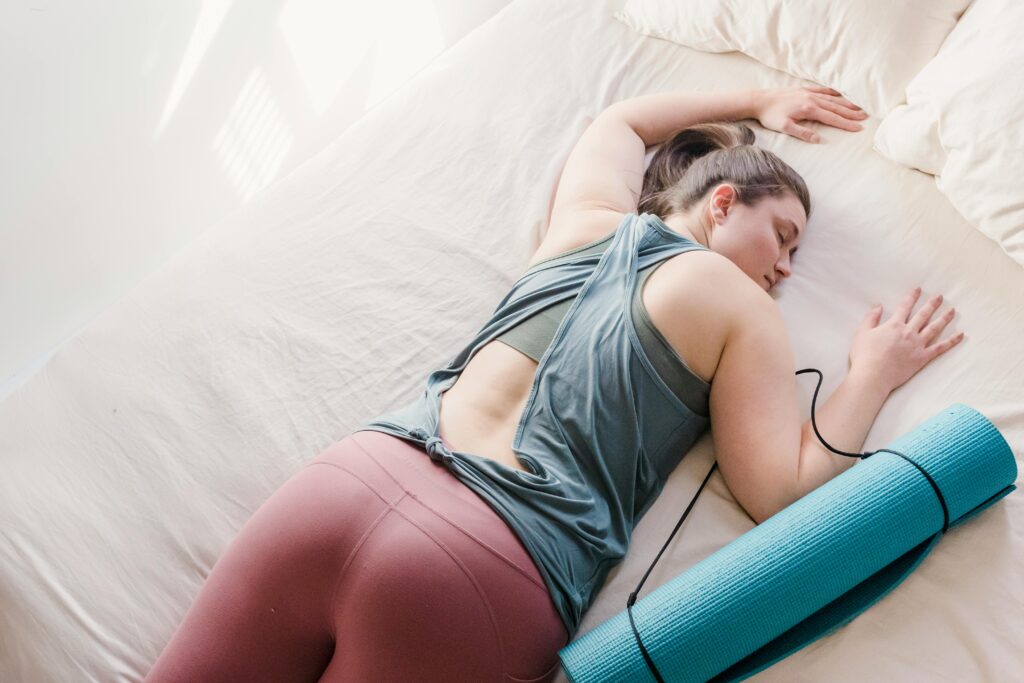Many people have this problem so today we discuss How To Sleep With a Pinched Nerve In shoulder Pinched nerves can impact various areas of your body, leading to symptoms that disrupt sleep and daily activities. Addressing a pinched nerve promptly is crucial to avoid long-term issues.
Adjusting your sleep position can help alleviate some of the discomfort associated with pinched nerves. Below are tips on how to manage and improve sleep with a pinched nerve.

Pinched Nerve Symptoms.
A pinched nerve occurs when the surrounding tissue exerts pressure on a nerve, causing symptoms such as:
- Pain
- Numbness
- Tingling
- Weakness in the affected area
These symptoms can hinder movement and make daily tasks challenging. It’s essential to seek treatment and find effective ways to manage the condition to maintain your quality of life.
How to Sleep with a Pinched Nerve
Sleeping with a pinched nerve can be difficult, and the optimal sleeping position varies depending on the location of the pinched nerve. Here are specific recommendations for different areas affected by pinched nerves:

You Can Also Like To Read This:- How To Sleep After Chiropractic Adjustment
Neck or Back.
Pinched nerves in the neck or back are common and often result in pain and numbness extending to the arms. This can make movements like turning your head or bending difficult. Here are some tips for sleeping with a pinched nerve in these areas:
- Avoid Sleeping on Your Stomach: This position places excessive pressure on your spine, potentially worsening the pain.
- Sleep on Your Side: This can help reduce symptoms. Ensure your pillow is neither too thick nor too thin; side sleepers typically need thicker pillows. Check that your spine is in a straight line while lying down.
- Use a Firm Mattress: A firm mattress supports your hips and shoulders, preventing them from sinking too much when you sleep on your side.
Arm or Shoulder
A pinched nerve in the arm or shoulder can cause significant pain and discomfort, particularly due to the compression of the major nerves in the arm. Here’s how to manage sleep in these cases:
- Sleep on Your Side: Lie on the side that is not affected by the pinched nerve.
- If Both Arms Are Affected: Sleep on your back with your arms straight to avoid further compression.
Hip
Pinched nerves in the hips are often related to sleep position, as compression around the bones, tendons, and ligaments can cause nerve issues. Consider the following tips:
- Sleep on Your Back: This position can help alleviate symptoms.
- If Sleeping on Your Side: Sleep on the side that is not affected by the pinched nerve and place a pillow between your legs to maintain hip alignment with your spine.

Pinched Nerve Treatment in Beverly Hills.
If you experience symptoms of a pinched nerve for more than a week, it is crucial to seek medical treatment. Pinched nerve treatment in Beverly Hills can address symptoms and provide strategies to prevent future occurrences.
How To Sleep With A Pinched Nerve In Shoulder.
Sleeping with a pinched nerve in the shoulder can be challenging, but there are several strategies you can try to alleviate discomfort and improve your sleep.
1. Choose the Right Sleeping Position.
- On Your Back: Place a pillow under your knees to keep your spine in a neutral position and reduce pressure on the shoulder.
- On Your Side (Opposite to the Affected Shoulder): Use a firm pillow to support your head and neck. You can also hug a pillow to prevent rolling onto the affected shoulder.
- Avoid Sleeping on the Affected Shoulder: This can exacerbate the pain and irritation of the pinched nerve.
2. Use Supportive Pillows.
- Cervical Pillow: Helps maintain proper neck alignment.
- Body Pillow: This can provide extra support and help keep you in a comfortable position.
- Memory Foam Pillow: Conforms to the shape of your head and neck, providing customized support.

You Can Also Like To Read This:- How To Sleep With Retainer Pain
3. Adjust Your Mattress.
- Medium-Firm Mattress: Provides adequate support without causing additional pressure points.
- Mattress Topper: Can add extra cushioning and support if your mattress is too firm or uncomfortable.
4. Practice Good Sleep Hygiene.
- Consistent Sleep Schedule: Go to bed and wake up at the same time each day.
- Relaxation Techniques: Deep breathing, meditation, or a warm bath before bed can help relax your muscles.
- Comfortable Sleep Environment: Ensure your bedroom is cool, dark, and quiet.
5. Pain Management.
- Over-the-Counter Pain Relievers: Medications like ibuprofen or acetaminophen can help reduce pain and inflammation.
- Topical Analgesics: Creams or patches applied to the affected area may provide temporary relief.
- Heat/Ice Therapy: Apply a warm compress or ice pack to the shoulder before bed to reduce pain and inflammation.

Broken Sleep Every Night? Click Here
6. Physical Therapy Exercises.
- Gentle Stretches: Specific exercises can help alleviate pressure on the pinched nerve. Consult a physical therapist for personalized recommendations.
- Strengthening Exercises: Building strength in the shoulder muscles can improve overall support and reduce the likelihood of future pinched nerves.
7. Consult a Healthcare Professional.
- If your pain persists or worsens, it’s important to seek medical advice. A doctor or physical therapist can provide a tailored treatment plan and suggest interventions such as corticosteroid injections or other therapies.

Summary.
To sleep better with a pinched nerve in the shoulder, focus on finding a supportive sleeping position, using the right pillows and mattresses, managing pain, and practicing good sleep hygiene. Consulting a healthcare professional is essential if the pain does not improve.


2 thoughts on “How To Sleep With A Pinched Nerve In Shoulder”